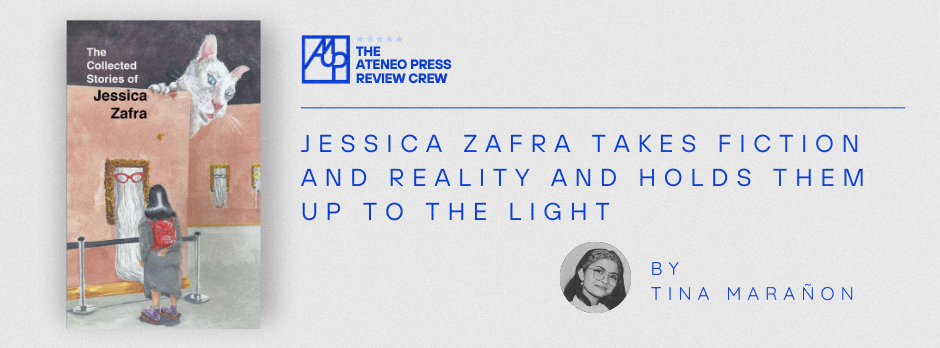[Ateneo Press Review Crew] Jessica Zafra takes fiction and reality and holds them up to the light
31 Mar 2025 | Tina Marañon
“The characters worry about an impending war between two countries, shitty politicos taking over the government, the earth swallowing everything up, and a city that remains increasingly unlivable.
Maybe not much has changed since.”
– Living in the Land of Twisted, Introduction to The Collected Stories of Jessica Zafra by Don Jaucian
Characterized by punchy prose and an endlessly peculiar catalog of characters, The Collected Stories of Jessica Zafra is an immensely enjoyable read and somewhat of a headache to ponder. The 2019 publication serves up a toothsome t-bone steak of Filipino stories that manage a skillful balance between fiction as a reflection of reality, and fiction as a reflection upon it.
The selection, taken primarily from Zafra’s 1992 collection Manananggal Terrorizes Manila and Other Stories and 2016 collection The Stories so Far, treats readers to a platter of narratives and characters whose concerns seem to span the whole spectrum of things a person could possibly come to reckon with. The experience is akin to a taste-tester of everyday human concerns, including but not limited to: an unwanted pregnancy of undetermined filiation (“Portents”), the middle-class woes of a newly unemployed young woman-turned-manananggal (spoilers! “Manananggal Terrorizes Manila”), a man’s ugly transition from planning a proposal and falling head-first out of love (“What’s That in Your Glass?”), and the awkward teenage boredom of prom night (“Through a Time Warp, With a Paddle”), all sung in a tune that is so recognizably Filipino.
What Zafra’s fiction offers Filipino readers—old and young, first-timers and long-time enjoyers alike—is a diverse tapestry of stories and scenarios rendered in scenes so familiar we can almost locate ourselves in them. In his introduction, queer Filipino writer Don Jaucian remarks on Zafra’s tendency towards observational realism, drawing on scenes from her own life and the lives of people she knows and blurring the line between narrator, persona and author. That Zafra’s fiction teeters perpetually on the edge of autobiography is easily clocked—virtually all of her stories are brimming with profiles and places rendered in a way that is so colloquial to the contemporary Filipino consciousness.
For the Filipino reader, this particular brand of fiction presents less of an escape and more of a mirror, a looking glass, or an exacto-knife with which one might examine reality. There are some instances where the stories take on a more overtly spec-fic tilt, and Zafra appears to dip her toe a bit more judiciously into the pool of speculative fiction—commenting, hyperbolizing, exploring, and satirizing fragments of society at the time of writing.
My favorite is “The Ouija Board of Thomas Edison”, which paints in satirical detail a vision of capitalism towards the turn of the century. In 1992, Jessica Zafra writes:
“Somewhere along the evolutionary path, the human desire to surpass its own achievements […] had been transmogrified into an unnatural craving for new products.”
“The Prophets of Profit in their three-piece Italian suits heard the supplications of credit-worthy consumers and fired off memos to their research departments. There began a race to produce recording technology new enough to placate the consumers and costly enough to keep the consumers in debt.”
It is chilling, as a reader in the 21st century, to realize that something written as a hyperbolic criticism of society in the 1990s now reads more like an accurate-to-life description of how a world (our world) operates in the throes of late-stage capitalism. A similar resonance registers when a character’s inner monologue sneers at the deceit and greed that define local politics, or when a queer city dweller finds themself worn out and angry after years of prejudice-fuelled derision. One realizes how not much has changed at all, or if it has, it only seems to have gotten more drastic.
Though Jessica Zafra may hardly be the first, nor is she the last, to wield fiction as a means of examining and appraising personal and universal truths, her writing is distinguished by a style that is unmistakably Filipino, through and through. Told like this, stories that may have struck a chord of relatability in their readers, regardless, are made to feel that much more proximate. They become tangible, like you could reach into a scene and grasp it.
You can get your copy in paperback: Website | Shopee and Lazada

Tina Marañon is a freelance writer and researcher. Her most recent research venture looks at the value of attentiveness in informing pedagogical design and fostering student motivation.





